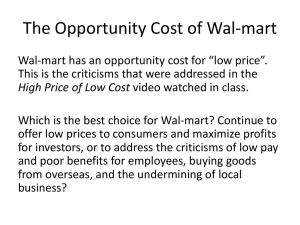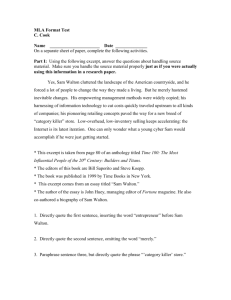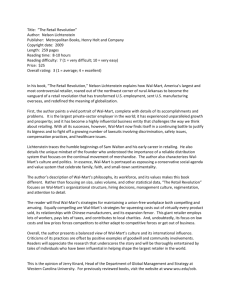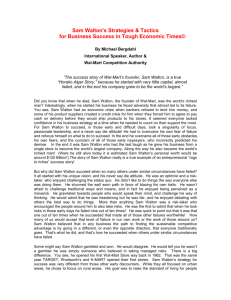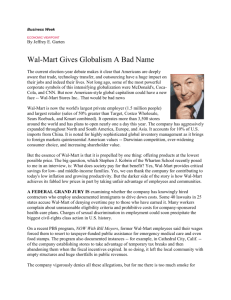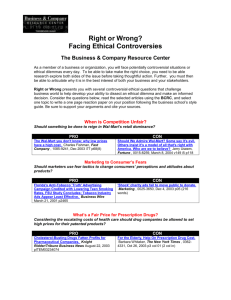Sam Walton & Wal-Mart: Q&A on Strategy & Culture
advertisement
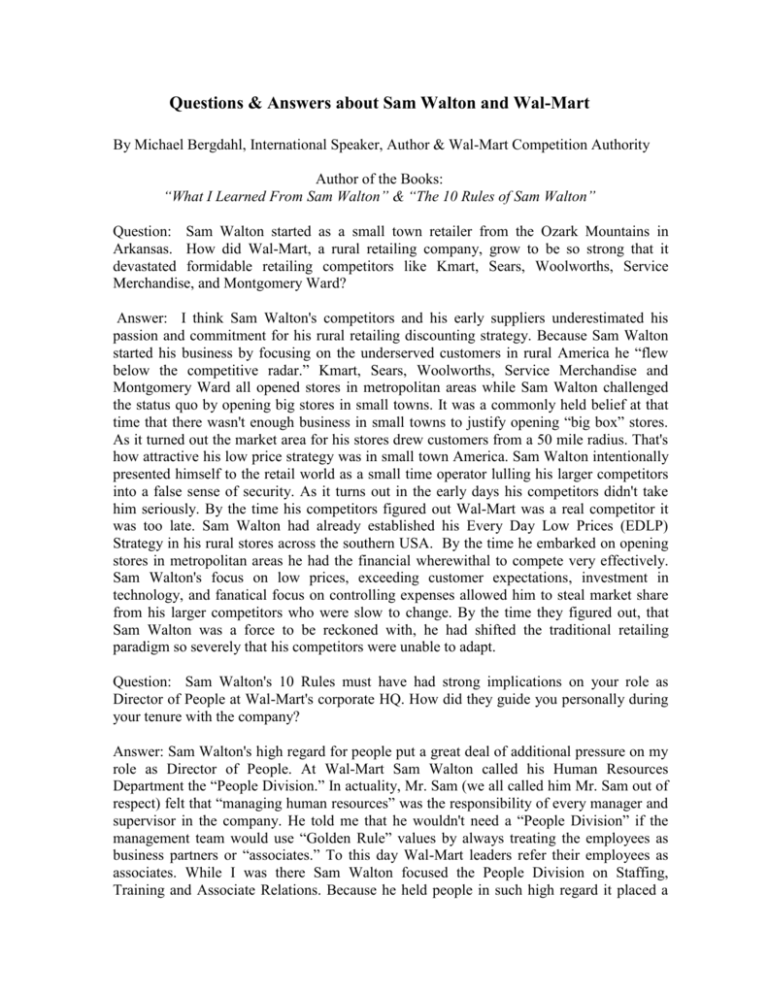
Questions & Answers about Sam Walton and Wal-Mart By Michael Bergdahl, International Speaker, Author & Wal-Mart Competition Authority Author of the Books: “What I Learned From Sam Walton” & “The 10 Rules of Sam Walton” Question: Sam Walton started as a small town retailer from the Ozark Mountains in Arkansas. How did Wal-Mart, a rural retailing company, grow to be so strong that it devastated formidable retailing competitors like Kmart, Sears, Woolworths, Service Merchandise, and Montgomery Ward? Answer: I think Sam Walton's competitors and his early suppliers underestimated his passion and commitment for his rural retailing discounting strategy. Because Sam Walton started his business by focusing on the underserved customers in rural America he “flew below the competitive radar.” Kmart, Sears, Woolworths, Service Merchandise and Montgomery Ward all opened stores in metropolitan areas while Sam Walton challenged the status quo by opening big stores in small towns. It was a commonly held belief at that time that there wasn't enough business in small towns to justify opening “big box” stores. As it turned out the market area for his stores drew customers from a 50 mile radius. That's how attractive his low price strategy was in small town America. Sam Walton intentionally presented himself to the retail world as a small time operator lulling his larger competitors into a false sense of security. As it turns out in the early days his competitors didn't take him seriously. By the time his competitors figured out Wal-Mart was a real competitor it was too late. Sam Walton had already established his Every Day Low Prices (EDLP) Strategy in his rural stores across the southern USA. By the time he embarked on opening stores in metropolitan areas he had the financial wherewithal to compete very effectively. Sam Walton's focus on low prices, exceeding customer expectations, investment in technology, and fanatical focus on controlling expenses allowed him to steal market share from his larger competitors who were slow to change. By the time they figured out, that Sam Walton was a force to be reckoned with, he had shifted the traditional retailing paradigm so severely that his competitors were unable to adapt. Question: Sam Walton's 10 Rules must have had strong implications on your role as Director of People at Wal-Mart's corporate HQ. How did they guide you personally during your tenure with the company? Answer: Sam Walton's high regard for people put a great deal of additional pressure on my role as Director of People. At Wal-Mart Sam Walton called his Human Resources Department the “People Division.” In actuality, Mr. Sam (we all called him Mr. Sam out of respect) felt that “managing human resources” was the responsibility of every manager and supervisor in the company. He told me that he wouldn't need a “People Division” if the management team would use “Golden Rule” values by always treating the employees as business partners or “associates.” To this day Wal-Mart leaders refer their employees as associates. While I was there Sam Walton focused the People Division on Staffing, Training and Associate Relations. Because he held people in such high regard it placed a great deal of pressure on everyone in the People Division to live up to his expectations. We focused on three areas: Hiring the Best, Providing the Best Training and Being the Best Place to Work. The cultural mantra at Wal-Mart is “Our People Make the Difference.” This saying was emblazoned across the sides of trucks and posted in the break rooms in the distribution centers and stores. Mr. Sam once said, “If you take care of your employees, the employees will take care of your customers, and the business will take care of itself.” Question: How does Wal-Mart maintain its renowned corporate culture? Answer: With over 7000 stores, 120 distribution centers and 2 million employees around the world maintaining its culture is a big challenge. The company will open over 500 new stores in 14 countries this year. It is estimated that 75% of management positions today are filled via internal promotions which leaves 25% of them filled with leaders hired from outside the company. Maintaining its culture with so many new stores, new managers, turnover of employees and new employees is a staggering challenge! Wal-Mart is the largest retailer in the world with sales exceeding $375 billion USD annually. The leadership teachings of Sam Walton were important 40 years ago at Wal-Mart, and they are still important today. Contrary to media reports, current company leaders still believe that people are the key to the success of the company! Question: Why do you think Wal-Mart is under so much fire these days? Is it because the current Wal-Mart leadership has strayed from Mr. Sam's 10 rules? Answer: When you are the largest company in the world the media has taken notice following every move that Wal-Mart makes. Many of the negative stories in the news media are blown completely out of proportion. The negative story reported typically represents a single incident in a single store. In these cases an individual site manager is responsible for a poor decision that has lead to company wide media scrutiny. The way the news is reported you would think the issue reported in the negative story is systemic across Wal-Mart. Nothing could be further from the truth. Many times special interest groups are responsible for fueling the media frenzy by hi-lighting or showcasing isolated examples of poor employee treatment, and portraying single examples as a companywide phenomenon. As unpopular as this may sound, Wal-Mart's leaders are good intending people, with golden rule values, who care about the people who work for the company. Current company leaders still embrace Sam Walton's 10 Rules using them as a touchstone as they make daily decisions. Question: Are the challenges that Wal-Mart faces today similar to those faced by Sam Walton? Answer: Because of the sheer size of the company Wal-Mart’s executives face daunting challenges today that have never been faced by a leadership team at any company before. In terms of people and serving customers the challenges are even more complex. There is even greater pressure today to control costs. The number of cash registers open and the number of employees on the floor has been reduced. Leaders are forced to step up to higher levels of responsibility without the prerequisite experience these bigger jobs demand. Retailing is all about people and somehow the people at Wal-Mart continue to figure out how to get the “24/7/365 job” done with less resources, and more work than ever before! Question: Why was Sam Walton so focused on customer service? Answer: Sam Walton believed that in order to succeed in any business you’ve got to focus on serving your customers. It’s your customers who pay your rent, your light bill, and provide you with a paycheck. The customer can fire you by simply deciding to do business elsewhere. That’s a good reason to make the customer #1 in any business! Wal-Mart teaches its leadership team to focus their time energy and efforts on the things that make a difference to the customers. They are taught to think about one store at a time, one department at a time and one customer at a time, otherwise the tasks at hand are overwhelming. Store management teams are taught to take ownership of serving the local customers, and they are empowered to run their local store as if it is the only store in the chain! Local managers cater to local customer preferences. Question: It has been reported that Sam Walton believed in simplifying everything at WalMart. How does such a large company do this? Answer: The key to the Wal-Mart Strategy in the past, in the present, and in the future is “simplification.” Leaders at other companies have a tendency to overly complicate their approach and solutions to complex projects with the strategy, “Think Big, Start Small and Scale Up”, while Wal-Mart teaches its leaders to simplify everything they do with its strategy, “Think Small, Start Small and Scale Up.” Complicated strategies can’t be implemented effectively in most organizations. Sam Walton valued simple solutions because his team in the stores both understood them, and they could execute them. Question: What was it about Sam Walton that made him so successful? Answer: Sam Walton believed in taking risks. He admitted that when he took risks in the early days 9 out of 10 times he failed! He said it was that 1 time out of 10 when he succeeded that made those 9 failures worthwhile. Sam Walton took big risks and reaped big rewards. He taught his leadership team the importance of managed risk taking. One of the great secrets to the success of Sam Walton was his belief called “swimming upstream.” Essentially his belief was to avoid the beaten path and to blaze his own trails. He believed, “If everyone else in retailing is doing it this way or going in this direction, why don't we try doing it too but in the opposite or a different direction!” He believed that by taking this approach he was likely to find the sustainable competitive advantage. Question: One criticism of Wal-Mart is that it's so powerful it forces suppliers to bend to its will or suffer. What would Sam Walton have said to this? Answer: Sam Walton was a proponent of the Free Enterprise System. The pressure placed upon manufacturers and suppliers today is no different than the pressure Sam Walton himself placed on his early suppliers. Wal-Mart Merchandise Buyers expect suppliers and manufacturers to earn a fair profit on the goods they sell to Wal-Mart and no more. If a supplier can't earn a profit supplying Wal-Mart they should either lower their manufacturing costs to become profitable or make the decision to stop supplying the giant retailer. Supplying Wal-Mart can be a manufacturers dream come true or their worst nightmare. There are many companies that choose not to supply products to Wal-Mart because they cannot achieve their profit goals. Other companies are too small logistically to supply the insatiable product needs of Wal-Mart. There are companies who choose to supply Wal-Mart whether they make a large profit or not simply to enhance the visibility of their brand. For those who do supply Wal-Mart the expectation is that that supplier needs to partner with Wal-Mart to ALWAYS deliver value to the retail customer. In reality there are three types of companies that supply products to Wal-Mart: those who make a profit, those who break even and those who lose money. Question: Six of the 10 Rules of Sam Walton are about how to treat people, but among the harshest criticisms that Wal-Mart faces today is that it exploits employees. Why do you think this has happened? Answer: In the USA much of the criticism is brought to the forefront by labor unions and other special interest groups. In the USA union membership has declined from almost 30% of the workforce 30 years ago to less than 9% today. The U.S. labor unions are desperately trying to organize the world's largest retailer, and failing miserably. In truth Wal-Mart pays its employees a competitive compensation package in the retailing industry which includes an above average retail salary, medical benefits, annual profit-sharing, 401K, and even a store bonus. The unions have tried for over 20 years to organize Wal-Mart's employees in its stores and distribution centers across the USA, and they have been unsuccessful. When a Wal-Mart employee relations issue arises the unions jump onboard, and do what ever they can to make a media mountain out of a mole hill! Don’t get me wrong, Wal-Mart is not a perfect company and bad things do happen from time to time. The reality is that WalMart's leaders embrace Mr. Sam's 6 rules about how people should be treated. Don't believe all the negative news you read or see in the media about Wal-Mart because the systemic criticism against Wal-Mart is unwarranted! Question: Why do you think Wal-Mart is so reviled by the American press? Do you think the criticisms are fair? Answer: In the USA I think much of the criticism stems from the impact Wal-Mart has had on small towns. Adding to the criticism is every retailing sector negatively impacted by Wal-Mart competition. Grocery stores have been unable to compete in direct competition. Convenience stores have suffered as Wal-Mart began selling gasoline: even Banks are up in arms over Wal-Mart's announcement they intend to go into banking. Wal-Mart has raised the standard of living for consumers around the globe but in the process its Every Day Low Prices have had a devastating impact on high priced main street merchants. As long as Wal-Mart is the world’s largest company it will continue to be under the media microscope. Question: A company could follow all these rules but still not be as successful as Wal-Mart. In fact, we haven't seen another Wal-Mart. What could be the missing ingredients? Answer: Rob Walton, who is the Chairman of the Board of Wal-Mart and the son of Sam Walton, wrote the Foreword for my book The 10 Rules of Sam Walton . In the Foreword he stated, “As large as Wal-Mart has become, we still find ourselves referring to Dad's “Rules for a Successful Business,” embodied in this book.” The 10 Rules are timeless because they are for the most part simple commonsense notions. Sam Walton would be the first to tell you that simple ideas have the best chance of being understood, followed and executed. That's the beauty of the simplicity of his rules. Sam Walton's goal was to make Wal-Mart the best retailer around not the biggest. His idea of success was providing the right products at the lowest price, and providing great service. If the leaders at other companies are willing to focus on running an excellent operation, treating their people right, and serving their customers they will be successful. I know that to be truly successful in any endeavor requires personal commitment on the part of the leader, commitment on the part of the followers, and a belief in a dream. The 10 rules are a blueprint for success which catapulted Sam Walton from a single store owner in the Ozark Mountains of Arkansas to become the most successful merchant in the history of the world! Will any other company or individual business leader achieve what Sam Walton has achieved? If an ordinary man like Sam Walton can achieve the extraordinary, it is possible someone else can too! Michael Bergdahl, International Speaker, Author & Wal-Mart Competition Authority Michael Bergdahl is a professional international business speaker, author and turnaround specialist. Bergdahl worked in Bentonville, Arkansas for Wal-Mart, as the Director of “People” for the headquarters office. He is considered an authority on Wal-Mart Competition, and he has appeared on CNN, CNBC, CNN FN, MSNBC, CNN International, CBS National Radio and Bloomberg TV. He has participated in internationally televised news debates on “Power Lunch”, “On the Money”, “Morning Call”, and “Closing Bell.” He maintains a Wal-Mart Competition Blog on his web site at: www.michaelbergdahl.net He is also the author of “What I Learned from Sam Walton: How to Compete and Thrive in a Wal-Mart World,” and “The 10 Rules of Sam Walton: Success Secrets for Remarkable Results.” His international keynote speaking experience includes: * Brisbane, Australia * Beijing, China * Melbourne, Australia * Vancouver, British Columbia * Toronto, Ontario * Mont Tremblant, Quebec * Caracas, Venezuela * Bogota, Colombia * Panama City, Panama * Cologne, Germany * Istanbul, Turkey * Malaga, Spain * Moscow, Russia * Port Douglas, Australia * Santiago, Chile * and across the USA. To contact Mr. Bergdahl, call 412-635-2638 , mbergdahl@aol.com or visit his website www.michaelbergdahl.net.
